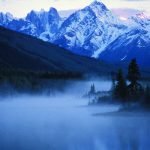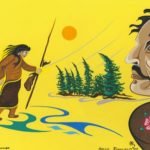Dehcho
Zhamba Déja Outsmarts an Evil Family
Zhamba Déja łą́ą ełéot’ı̨ kı́ dene genezų ı́le goghǫzhádéɂa
Atthe t’ǫ́h, Zhamba Déja dekǫ́ę́ Gah Eteneh ekǫ Náı̨lı̨cho godéh gots’ęh déhtł’ah. K’etleh gots’ęh elá t’áhchu aht’ı̨, kat’ı̨ lǫ́ǫ ekúh golǫa nechácho k’eɂáh ı̨lé łaadeh gots’ęh amı̨́ı̨ goxéh gonezų ı́le nıdé gots’ą́ąndı kat’ı̨. Gok’eadetł’e lǫ́ǫ gotsı́e gots’ęh gotsų kı́ dene nezų egıt’éh ı́le gots’ęh gotué goghǫétł’ah.
Iı dene Zhamba Déja ką́hndı, sı̨ dúle ełets’ágendı t’áh k’ı̨́ gehtsı̨. Ezhı dene kı́ dene nezų ı́le Zhamba Déja kąhndı, ekǫ k’áchı̨nıa see ɂehtth’I zhádéɂa zǫh kánıt’a zhę́hndı. Zhamba Déja káchınıa káneta lǫ́ǫ́ the łǫ ełedáh zháhthéla ghǫetłah. Ezhı the Zhamba Déja ts’ę́ tthee aget’ı̨. Kó nezų gots’ę́ gondeh t’áh ts’ınıh agejá, ıı gotł’ą́ą dehgáh dee gots’ę́ godéhde, dúh gots’ę́ k’álah ejı thela.
Zhamba Déja k’áchınıa nátthehtsı t’áh nı́anotł’ah, ıı dene kı́ nezų ı́le edáondı́ t’áh kı́ Zhamba Déja łanıdhe ı́le enıdhę t’áh zhech’áh dahdzeedatlłah. Ezhı gotł’ą́ą Zhamba Déja k’áhndı́ ehndaa t’á k’ı̨́ gha kánıtá zhę́hmdı. Zhamba Déja ehndaa met’ǫcho ghǫetłah mezhı̨́h ehndaa aets’élıe ǫkı geke. Ehndaa denelı̨a kadı, memǫ gots’ęh metá t’ahsı́ı nágezéh gots’ę́ łégedéhtthe ndı. Ezhı Ehndaa gomǫ gots’ęh gotáh nı́ełégı̨tthe, edáondı́ dene łagénıhthę gots’ęh gotthę́ nı́agénıla, ezhı gha Zhamba Déja łagónıhthe. Ehnda denelı̨a zǫh zhets’áı̨ndı́ t’áh kı́ dasázhı̨́lá ı́le. Zhamba Déja ezhı ehndaa denelı̨a káhndı, dúh gots’ę́h ndaa łué gots’ę́ golǫa tthę́ zǫh shénetı̨h zhę́hndı. See deghá ezhı ehndaa denelıa édéhtsı̨h, ezhı ts’ı̨hɂǫ́ dúh got’sę́ kı́ ehndaa nechá gháts’enda ı́le.
Zhamba Déja ehndaa t’á nı́anıddhah. Ezhı ǫhndah Zhamba Déja k’álah gondı́h megha dzǫ́ǫt’e. Zhamba Déja káhndıh, k’ı̨́ gha tth’éh enı́ddhę ndı gots’ęh kodı̨ godéhro nánde gots’ę́ zhedéhɂa. Zhamba Déja ts’ıneh t’áh godéhro ghǫetłah gots’ęh k’ı̨́ t’áh taelı́ zhedzee ghaenıhgé ıt’áh łazhénıhtthe. Zhechı̨́tah gots’ęh ech’ı́dé káıtthé gots’ęh ǫhndah t’sę́ nadéhtł’ah.
Zhamba Déja, k’áchınıa, ehndaa t’á gots’ęh tth’éh shu nátthetsı̨. Ezhı t’ahsı́ı kanéht’é náhtthetsı̨ t’áh k’ı̨́ déhtsı̨.
Edı la Madeline Mouse, edı dene Robert G. Williamson gondı ghǫ zhégoınde ke’h ǫ́t’e.
Zhamba Déja Outsmarts an Evil Family
Long ago, Zhamba Déja left his home at Rabbit Kettle above Virginia Falls. He walked and paddled throughout the land, killing giant animals and looking for people in trouble that he could help. Along his journey, he met an evil old couple and their daughter.
The man asked Zhamba Déja to help make arrows. The evil man instructed Zhamba Déja to gather branches that grew hard and straight. While looking for branches, Zhamba Déja came upon a big pile of rocks. The rocks rose up to attack him. Zhamba Déja calmed the rocks and dispersed them to creeks and riverbeds, where you will find stones today.
When Zhamba Déja returned with branches, the man was surprised to see him alive. Next, he sent Zhamba Déja to collect eagle feathers to serve as flights for arrows. Zhamba Déja approached a giant eagle nest with two baby eagles inside. The boy eagle told him his parents were out hunting. When the mother and father eagle returned carrying human flesh, Zhamba Déja killed them. He spared only the boy eagle who had helped him. Zhamba Déja made the baby eagle promise to eat fish and game instead of humans. He squeezed him so that he would never grow bigger, which is why there are no more giant eagles.
Zhamba Déja returned to camp carrying eagle feathers. The old man was disappointed that Zhamba Déja was still alive. He said he needed sinew to bind the arrows and sent Zhamba Déja to a swamp where a giant monster lived. Zhamba Déja carefully approached the monster and shot it in the chest with three arrows, killing him. He cut out sinew from the monster’s back and brought it back to the man.
Zhamba Déja had gathered branches, feathers, and sinew. Using sharp arrowheads, he proudly made arrows out of these materials.
Adapted from a story told by Madeline Mouse to Robert G. Williamson on the Liard River.



